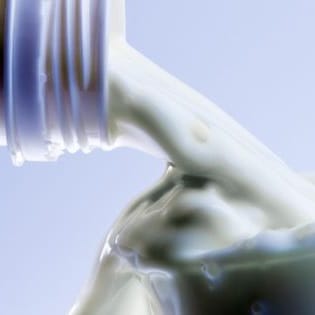Cow milk is a valuable source of calcium and other nutrients and it is cheaper than various milk substitutes. However, more and more people are refraining from drinking milk because they suffer from lactose intolerance or because they do not want to consume animal foods. For those individuals, the food industry offers a variety of substitutes made from almonds, soy beans or rice. In a recent test, 21 plant-based milk substitutes – twelve soy, five rice and four almond drinks – were tested and tasted in the lab.
A chemical analysis of the products measured the levels of chlorate / perchlorate and calcium, as well as the total amount of sugar. The rice drinks were additionally tested for arsenic. The soy drinks were tested to see whether they contained genetically modified organisms.
The tasting tests evaluated the appearance, smell, consistency and taste.
Soy milk is cheapest
Soy drinks were the first ones on the market. Compared to competitors, they are quite cheap at an average cost of €1,70 per liter. Joya (Soya Frisch + Calcium) had the highest score with 69 out of 100 points. This product is the only one that is not heated at a high temperature, it therefore has to be stored in cool places and also has a shorter shelf life. Seven manufacturers resorted to Austrian goods. Provamel, Alnatura, Biotrend and Alpro refused to disclose the origin of their raw materials. Not a single product contained genetically modified organisms.
Rice drinks with lots of sugar
Those who decide on rice drinks pay an average of €2,03 per liter. Generally, these drinks contain more sugar than the sweetened soy drinks.
In rice and thus rice products one repeatedly finds elevated arsenic levels. Values between 3,1 (Natumi) and 16 (Spar veggie) micrograms (μg) of arsenic per liter were found in the 5 rice drinks investigated. Overall, a good result, because all tested drinks, excluding the product from Spar, contained less than 11,7μg of inorganic arsenic / l. An average value determined by the EFSA (European Food Safety Authority) in a major rice drink survey. Nevertheless, paying attention is still a must! Even though arsenic levels may be low, rice drinks are not to be consumed by infants or toddlers. And adults should regularly switch to other milk alternatives.
Almost three euros for almond milk
The milk alternatives with almonds – at €2,82 per liter on average – are the most expensive option. The organic products demand up to €3,60. None of the tested almond drinks tested positive for NOT adding sweeteners. Furthermore, the list of ingredients besides water and almonds is long. There are added thickeners, emulsifiers and stabilizers.
